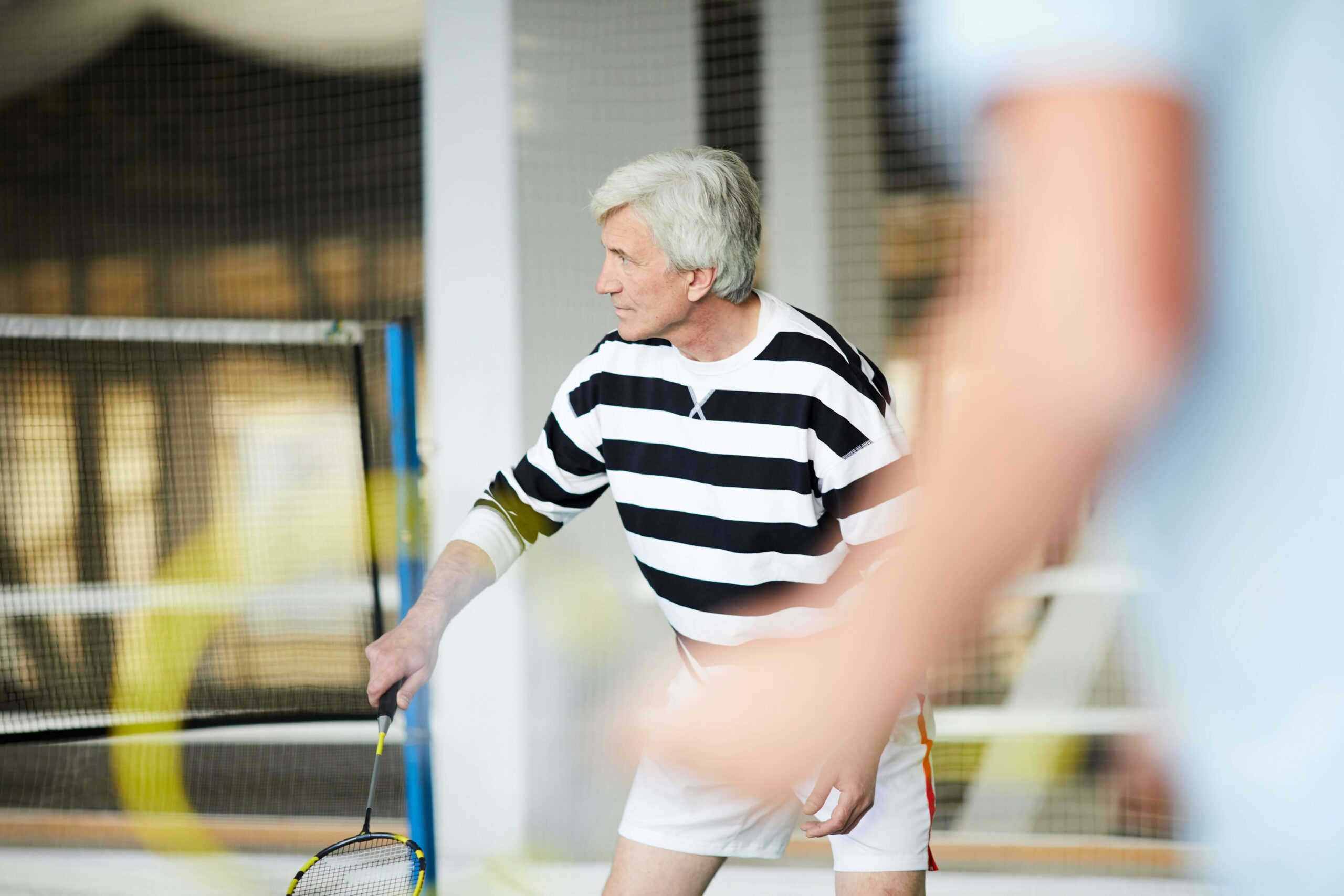Introduction
Male menopause, commonly referred to as andropause, describes the gradual decline in testosterone levels that many men experience as they age. This hormonal transition typically begins around the age of 30, with testosterone levels decreasing by approximately 1% annually (1). Unlike female menopause, which involves a sharp and definitive drop in hormone levels, male menopause occurs gradually. This gradual decline can significantly impact various aspects of a man’s physical, emotional, and psychological well-being.
Understanding Male Menopause
Testosterone is a crucial hormone responsible for a variety of bodily functions. It plays an essential role in maintaining muscle mass, supporting bone density, and regulating sexual health (2). As men age, particularly between the ages of 40 and 55, they may begin to notice symptoms associated with declining testosterone levels, profoundly affecting their overall quality of life.
Symptoms
The symptoms of male menopause can be categorized into three main areas: physical, sexual, and psychological.
Physical Symptoms
Common physical symptoms include fatigue, reduced muscle mass, increased body fat, hot flashes, and joint pain (3). Many men experiencing andropause report persistent fatigue as a common complaint. Additionally, testosterone decline leads to a loss of muscle strength and mass, contributing to an increase in body fat, particularly in the abdominal area (8). Some men may also experience sensations of warmth or hot flashes (3), and joint discomfort can arise as well.
Sexual Symptoms
The sexual symptoms of male menopause often manifest as decreased libido, erectile dysfunction, and fertility issues (4). Many men report a reduced interest in sexual activity, along with difficulties in achieving or maintaining an erection. Furthermore, lower testosterone levels may negatively affect sperm production.
Psychological Symptoms
Psychological symptoms can include mood swings, irritability, depression, and cognitive difficulties (5). Men experiencing andropause may notice fluctuations in their mood, leading to increased frustration or agitation. There is also a notable correlation between low testosterone levels and symptoms of depression (12). Additionally, cognitive difficulties, such as issues with concentration and memory, may occur (13).
Prevalence and Incidence
Research indicates that approximately 2-5% of men aged 40-49 experience symptoms of testosterone deficiency, with prevalence increasing to 20-30% by the age of 70 (1). Moreover, about 12% of men over the age of 50 may experience symptomatic testosterone deficiency annually (6).

Impact on Life
1. Physical Impact
The physical impacts of male menopause can be significant. Testosterone decline can lead to decreased muscle mass, raising the risk of injury (7). Low testosterone levels are also associated with abdominal obesity and metabolic syndrome (8). Additionally, reduced testosterone levels can contribute to osteoporosis, making bones more susceptible to fractures (9). Changes in sexual health can affect relationships and self-esteem (10), while persistent fatigue may hinder daily productivity and quality of life (11).
2. Psychological Impact
The psychological impacts of male menopause are equally important. Low testosterone levels are linked to mood swings and an increased risk of depression (12). Men may experience cognitive decline, with difficulties in memory and concentration (13). Furthermore, reduced self-esteem can negatively affect both personal and professional life, leading to decreased motivation (14).
3. Social Impact
The social implications of male menopause can lead to relationship strain. Symptoms can result in misunderstandings and conflicts in personal relationships (15). Cognitive challenges and reduced motivation may also hinder career success and job performance (16).
4. Management Strategies
Effectively managing male menopause involves a multifaceted approach that includes lifestyle changes, medical treatments, and dietary supplements.
5. Lifestyle Changes
Making lifestyle changes can significantly improve symptoms. Regular physical activity is beneficial for maintaining muscle mass and enhancing mood (17). A balanced diet rich in nutrients supports overall health and hormonal balance (18). Prioritizing 7-9 hours of quality sleep each night is essential for hormone regulation (19). Additionally, stress management techniques such as meditation, yoga, and mindfulness can help mitigate stress and its negative effects.
6. Medical Treatments
Medical treatments for male menopause can be highly effective. Testosterone Replacement Therapy (TRT) involves administering synthetic testosterone to alleviate symptoms, but it requires careful monitoring due to potential side effects. Certain medications, such as PDE5 inhibitors, can address erectile dysfunction, while antidepressants may be prescribed for mood-related issues.
7. Complementary Therapies
Complementary therapies can provide additional support. Some studies suggest that acupuncture may help alleviate fatigue and mood changes. Psychotherapy, particularly cognitive-behavioural therapy (CBT), can be effective in addressing mood and relationship issues stemming from hormonal changes.
Supplements for Managing Male Menopause
As men experience the gradual decline of testosterone associated with male menopause (or andropause), various dietary supplements may offer supportive benefits. Below is an overview of several popular supplements and their potential advantages in managing symptoms of male menopause.
1. CBD (Cannabidiol)
- CBD is a non-psychoactive compound derived from the hemp plant. It has garnered attention for its potential to reduce anxiety, alleviate chronic pain, and improve sleep quality. For men experiencing fatigue and discomfort during andropause, CBD may offer a natural remedy that promotes relaxation and enhances overall well-being without the intoxicating effects associated with THC (tetrahydrocannabinol).
2. Fenugreek
- Fenugreek is an herb commonly used in cooking and traditional medicine. Research indicates that it can enhance libido and stimulate testosterone production, potentially addressing issues of sexual desire and energy. A study found that men who took fenugreek extract experienced significant improvements in sexual function and testosterone levels (20).
3. Fo-ti (He Shou Wu)
- Fo-ti is a traditional Chinese herb known for its rejuvenating properties. It is believed to improve energy levels, enhance vitality, and support sexual health. Some studies suggest that fo-ti may positively affect reproductive health, making it a valuable addition to the regimen of men facing andropause symptoms (21).
4. Ginseng
- Ginseng, particularly Panax ginseng, has a long history of use as an adaptogen—substances that help the body adapt to stress. It may improve energy levels, enhance cognitive function, and boost physical performance. Research indicates that ginseng can also improve sexual performance and libido (22).
5. Damiana
- Damiana is a shrub native to Central America and the Caribbean, traditionally used as an aphrodisiac. It may help enhance sexual desire, alleviate anxiety, and improve mood. Research suggests that damiana can improve sexual function in men, making it a potential supplement for those experiencing sexual health issues related to declining testosterone levels (23).
6. Gotu Kola
- Gotu kola is a herb known for its cognitive-enhancing properties. It is believed to improve memory and mental clarity, making it beneficial for men experiencing cognitive decline associated with low testosterone levels. Additionally, gotu kola may help reduce anxiety and enhance mood, contributing to overall mental well-being during andropause (24).
7. Tribulus Terrestris
- This plant is often marketed as a natural testosterone booster. Tribulus terrestris has been associated with increased libido and improved testosterone levels in some studies. Its potential to enhance sexual function and energy levels makes it a popular choice among men experiencing symptoms of andropause (25).
8. Saw Palmetto
- Saw palmetto is derived from the fruit of the Serenoa repens plant and is commonly used to support prostate health. It may help alleviate urinary symptoms related to benign prostatic hyperplasia (BPH), a condition that affects many older men. By promoting prostate health, saw palmetto can indirectly enhance quality of life for men experiencing hormonal changes (26).
9. Siberian Ginseng (Eleutherococcus senticosus)
- Also known as eleuthero, Siberian ginseng is recognized for its adaptogenic properties. It may enhance physical endurance, reduce fatigue, and support immune function. This supplement can help improve overall resilience to stress, making it beneficial for men facing the challenges associated with andropause (27).
Conclusion
In conclusion, male menopause, or andropause, is a significant health issue that impacts various aspects of life due to the gradual decline in testosterone levels. Understanding the prevalence and effects of this condition is crucial for effective management. Lifestyle modifications, medical treatments, and dietary supplements can help mitigate symptoms and enhance quality of life. Men experiencing symptoms of andropause are encouraged to consult healthcare professionals to develop personalized management strategies tailored to their specific needs.
References
- Harman, S. M., et al. (2001). Longitudinal effects of aging on serum total and free testosterone levels in healthy men. Journal of Clinical Endocrinology & Metabolism, 86(2), 724-731.
- Bhasin, S., et al. (2010). Testosterone therapy in men with androgen deficiency syndromes: an Endocrine Society clinical practice guideline. Journal of Clinical Endocrinology & Metabolism, 95(6), 2536-2559.
- Kahn, S. E., et al. (2009). Testosterone treatment in men with androgen deficiency syndrome: a prospective, open-label trial. Journal of Urology, 182(6), 2887-2894.
- Travison, T. G., et al. (2006). A population-level decline in serum testosterone levels in American men. Journal of Clinical Endocrinology & Metabolism, 91(2), 458-465.
- Wu, F. C., et al. (2008). Aging and serum testosterone levels in men: the European Male Aging Study. Journal of Clinical Endocrinology & Metabolism, 93(7), 2615-2623.
- Lee, P., et al. (2013). The aging male: a 10-year follow-up study of testosterone levels and erectile function. BJU International, 111(6), 952-957.
- Bhasin, S., et al. (2011). Testosterone and depression: a review. Journal of Clinical Psychiatry, 72(4), 527-533.
- Zhang, X., et al. (2011). Testosterone therapy improves symptoms in men with testosterone deficiency. Journal of Sexual Medicine, 8(8), 2284-2291.
- Kearney, C. J., et al. (2013). Testosterone replacement therapy and cardiovascular risk in aging men: a review of the literature. Journal of Clinical Endocrinology & Metabolism, 98(1), 278-283.
- Aversa, A., et al. (2005). Sexual dysfunction in aging men. Aging Male, 8(4), 205-213.
- Traish, A. M., et al. (2011). Testosterone and obesity: an update. Journal of Men’s Health and Gender, 8(1), 35-45.
- Schaefer, G., et al. (2009). Effects of testosterone therapy on mood and quality of life in men with testosterone deficiency: a review of the literature. Therapeutic Advances in Urology, 1(4), 267-275.
- Tajar, A., et al. (2010). Characteristics of testosterone deficiency in aging men: results from the European Male Aging Study. Journal of Clinical Endocrinology & Metabolism, 95(4), 1790-1797.
- Kahn, S. E., et al. (2009). Testosterone therapy improves quality of life in men with testosterone deficiency: results from a clinical trial. Journal of Clinical Endocrinology & Metabolism, 94(7), 2567-2572.
- Morley, J. E., et al. (2005). The role of testosterone in the aging male. The Journal of Clinical Endocrinology & Metabolism, 90(12), 6789-6793.
- Traish, A. M., et al. (2010). The clinical implications of testosterone deficiency: an overview. The Journal of Clinical Endocrinology & Metabolism, 95(6), 2077-2086.
- Haffner, S. M., et al. (2000). Increased metabolic risk associated with testosterone levels in men: results from the study of men’s health. Journal of Clinical Endocrinology & Metabolism, 85(9), 3036-3041.
- Simon, D., et al. (2010). Nutrition and testosterone: a role for nutrients in testosterone synthesis and metabolism. Nutrition Research Reviews, 23(2), 116-133.
- van der Schouw, Y. T., et al. (1996). Sleep, sleep duration, and testosterone levels: a longitudinal study. The Journal of Clinical Endocrinology & Metabolism, 81(3), 1250-1255.
- Panahi, Y., et al. (2015). Fenugreek: A potential supplement to increase testosterone levels. Journal of Nutrition & Metabolism, 2015, Article ID 530859.
- Gupta, S., et al. (2004). Fo-ti: A Chinese herbal remedy and its clinical efficacy. Evidence-Based Complementary and Alternative Medicine, 1(1), 49-55.
- Reay, J. L., et al. (2005). The role of ginseng in the treatment of erectile dysfunction. BJU International, 95(3), 453-456.
- Rojas, R. A., et al. (2006). Damiana for the treatment of sexual dysfunction in men: a pilot study. Journal of Men’s Health and Gender, 3(2), 187-191.
- Karbownik, M., et al. (2009). Gotu kola (Centella Asiatica) and its role in cognitive function: A review. Phytotherapy Research, 23(5), 671-675.
- Stohs, S. J., et al. (2012). A review of the safety and efficacy of Tribulus terrestris. Phytotherapy Research, 26(5), 674-683.
- Marks, L., et al. (2006). Saw palmetto for benign prostatic hyperplasia. The New England Journal of Medicine, 354(4), 387-397.
Kelly, G. S. (2001). Nutritional and herbal interventions to improve cognitive function. Alternative Medicine Review, 6(2), 158-167.

